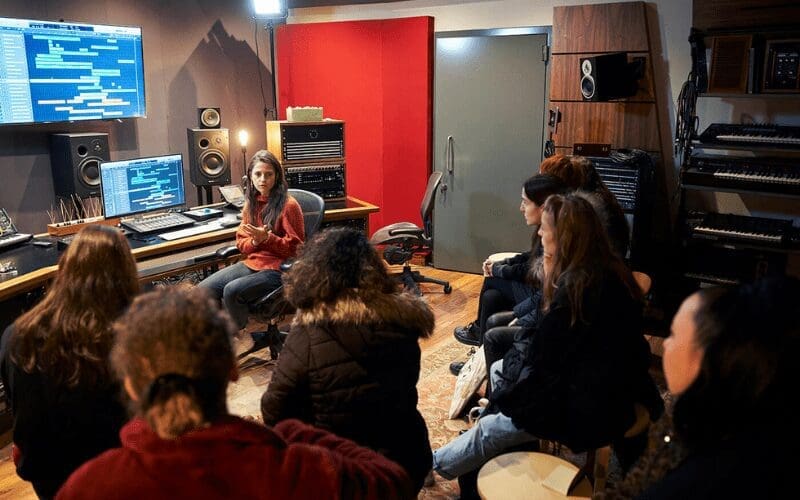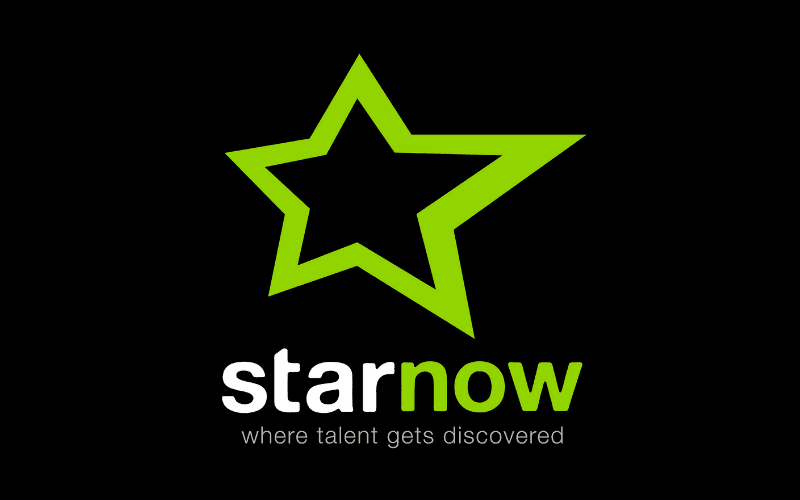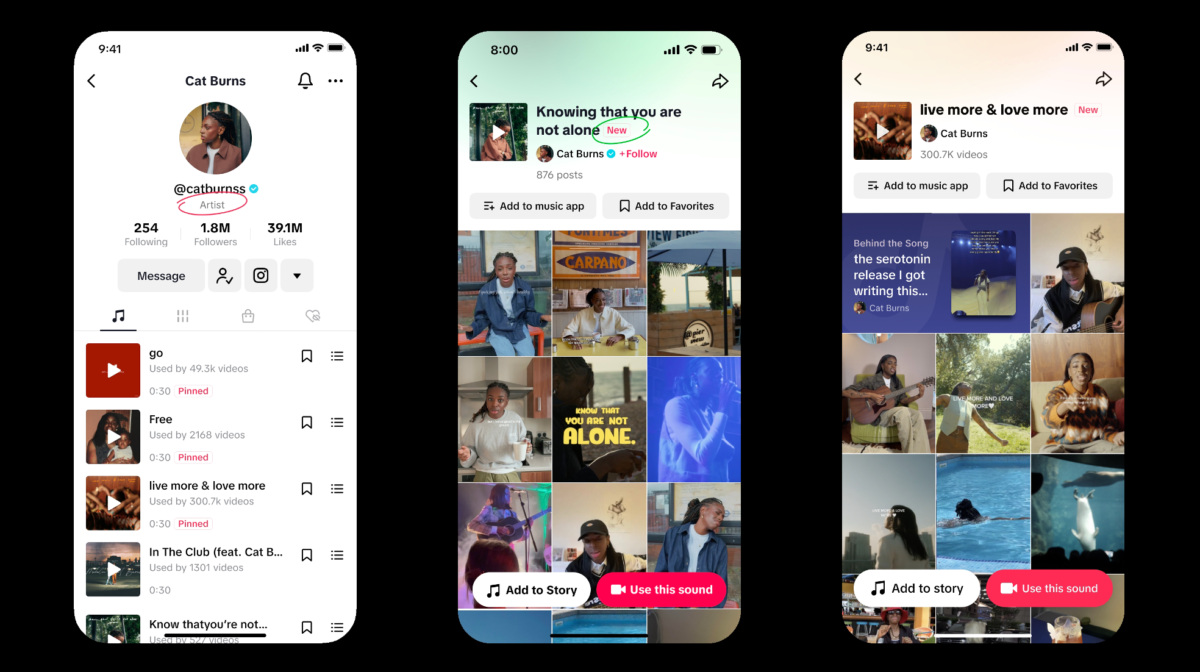Sheryl Crow, Gwen Stefani, Whitney Houston – all these legendary artists began their careers as professional background singers. Even Dave Grohl did backing vocals while drumming for Nirvana, preparing him for becoming the frontman of the Foo Fighters. But what exactly constitutes being a background singer, and how do I become a background singer?

In this article, we’re going to take you through all the vital information about starting your career as a background singer. Whether you want to use your voice while avoiding the stress of the limelight, or you’d like to make the connections necessary to eventually become a renowned solo artist, here’s everything you need to know!
What Is A Background Singer?

Background singers provide backing vocals for the front-and-center artist, either in a recording session or live performance. The job title is synonymous with ‘backing singer/vocalist’, ‘backup singer/vocalist’, and in some cases ‘session singer/vocalist’.
There is a slight difference between a background singer and a session singer. Background singer is a catch-all term, referring to anyone who provides backing vocals; session singers are specifically backing vocalists who are more involved with recording than live performance and work on a session-by-session basis (hence the name). Indeed, background singers may work on a largely freelance session-by-session basis or may be hired by the front-and-center artist as a regular fixture. For example, Taylor Swift has employed her regular background singers – known as ‘The Starlights’ – since 2012.
With the potential to be employed, background singers have a higher chance of making big money than solo artists. You’ll need to be ok with eschewing the limelight though – it’s the job of the background singer to support the main artist. Steal the attention too much, and you’ll quickly find yourself out of work!
What Does A Background Singer Do?

It’s the job of the background singer to deliver their vocal performance as close to the producer’s/composer’s vision as possible.
To achieve this, every successful backing singer needs to have impressive control over their voice – as well as some music theory knowledge. It’s a must to have the ability to harmonize, and more often than not, sight-read sheet music too.
As a background singer, you’ll be working with many different people on a regular basis. Put simply, backing vocalists are amazing team players! No divas allowed – you need to work in tandem with your fellow background singers to deliver the sound envisioned by the producer/composer.
How Do I Become A Background Singer?
There are multiple routes to becoming a professional background singer. At the end of the day though, it all comes back to that one crucial word: experience. Let’s take a look at two different paths you could go down!
What Qualifications Do I Need To Be A Background Singer?

You might be wondering about getting some kind of official qualification in music, or vocal performance. Many creative roles in the music industry do require degrees to get started – but thankfully, background singing isn’t one of them.
Now don’t get us wrong – a degree in music will absolutely help in taking that first step. As we mentioned before though, experience is king. Project managers won’t be asking for your degree certificate, but studying at university is undeniably a fantastic method of gaining experience and making connections.
That being said, background singing requires – obviously – singing ability. If you have never had professional vocal training, then that is clearly your first step. At the end of the day, your qualification is your ability. The quality of your portfolio will determine how successful you are as a background singer.
How To Become A Background Singer Without Qualifications

So if you don’t need official qualifications, how then do you actually become a background singer?
As we’ve mentioned a silly amount of times already, successful background singers need to have experience on the job! But why is this? Well, assuming you’re a professionally trained singer and have mastery over your own voice, that skill is only half of the job. The other half involves the know-how surrounding studio recording, live performance, microphone technique, and group vocals. This is the knowledge that can only be learned by doing; as well as working alongside composers, producers, sound engineers, artists, and other backing vocalists.
To get this experience, it’s a really good idea to work for free while you build your portfolio. Do any background singer jobs you can here and there – for friends, university projects, or online job listings. The more you work, the more connections you build, and the more working experience you gain.
Additionally, it’s a massive help to have your own home studio setup. It doesn’t need to be super sophisticated – a decent microphone and a simple Digital Audio Workstation will do. You might occasionally be asked for a vocal demo before getting hired for a project, and the faster you can produce that, the better. The ability to create your own high-quality vocal recordings also demonstrates that you have an understanding of the recording process and that you appreciate the jobs of the producer/sound engineer. A team player is always loved!
Where To Find Background Singer Jobs

It would be helpful if there was a single website dedicated to advertising and hiring background singers, but unfortunately, finding jobs is all about the dreaded word: connections.
This is why we mentioned earlier that a music degree can certainly help kickstart your backing vocalist career. You won’t find a more condensed collection of music industry professionals than at university; and if you play your cards right and put in the effort, you could get significant professional experience while you’re there. Your lecturers and professors will have extensive industry contacts, so it always pays off to be permanently ‘on the job’. You never know when you might bump into someone with a lucrative opportunity, so prepare to conversate!
That rule absolutely remains outside of universities too. On backing vocal jobs, make sure that you don’t just turn up, sing, and go home. Network, network, network!
Joining choirs and acapella groups is a fantastic place to start, especially if you’ve not had much experience singing as a group before. You’ll gain the ability to sing in tight harmonies, keeping your voice balanced with the others. Your ear will become increasingly attuned to the group vocals’ needs, and you’ll be able to control and adapt your voice accordingly.
Additionally, don’t be hesitant to work for free – every single background singer has done so! Small gigs, small festival slots, low-budget recording sessions; every little thing helps. Becoming a background singer is very much a step-by-step process. Using your voice as your career is an absolutely wonderful reality, but it can’t happen overnight.
Agencies & Websites

Once you’ve made several lucrative connections in the industry, you might find the opportunity to join an agency. Getting signed up can give you fantastic access to previously unavailable background singer jobs. This is usually how backing singers start to make serious money – the agency will take a cut, but at least that ensures you’re getting paid in the first place!
For anyone starting out on a session-by-session basis, there are a number of great websites you can advertise your skills on. Creative music industry professionals often look for talent on these websites, and while you won’t be earning the big bucks from these, it’s certainly a great starting point. Have a look at Gumtree, Starnow, or Mandy. Search ‘background singer jobs near me’, and you’re good to go.
Salary

Being a performance job in the music industry, the salary of background singers ranges massively. On average, statistics show that backing vocalists can earn anywhere between £18,000 to £80,000 a year. Those numbers alone should demonstrate how varied this career can be!
Most background singers work session-by-session, meaning it’s incredibly hard to pin down a single number. You could be earning £8 per hour in the studio, or £80. Once again, it completely depends on your experience and connections. Regardless, with enough drive, passion, and skill, you’re already on the path to earning big money.
For backing singers who are regularly employed by artists – such as Taylor Swift’s ‘The Starlights’ – their income is far more regular. However, it still varies hugely depending on the size of the artist in question. No doubt that The Starlights are on the upper echelon of background singer salaries!
Now You Know How To Become A Background Singer

By far one of the most important backbones of a recording or performance, being a background singer is one of the most honorable jobs in the music industry. Vocal harmonies are often the touch of class, intrigue, and satisfaction in any song. Your job is to use your mastery of voice to create the most luscious sounds heard in music, all without stealing the limelight. That’s hard to do!
The difficulty of background singing is what makes it so impressive, though. Whether you want to earn a good income and avoid the stress of the limelight, or use your backing vocals to kickstart a successful solo career, it’s a role that every singer should consider. No doubt that it’s hard work to get started; but you’ll start making connections faster and faster, and before you know it, you’ll quit your day job to start the career you’ve always dreamed of.
At the end of the day, you’ll be using your voice to make a living; that sounds pretty dreamy to us!
Music Gateway Can Help
We can also help you connect with managers who have worked with huge artists worldwide through our artist management page. As well as help you boost your career and connections with artist development.
We’re constantly searching for fresh music from individuals like you! Contact our Music Promotions or Sync Licensing department to learn more about our thrilling services and how we can assist you. If you have songs that you want to share with the world – we want to help boost your career and get them noticed including marketing and promoting your music – and improving your streaming presence!










